
Marty Culjat, PhD is the SVP, Global Head of Digital Medicine & Regulatory Innovation at EVERSANA. In this role, he leads a cross-functional team supporting the commercialization of digital medicine products within companies ranging from startups to large pharma. He is widely recognized as an expert in regulatory affairs and strategy in digital health, having supported more than 50 companies in this area over the past few years, serving as the de-facto regulatory head of digital health within multiple large pharma companies, and serving as a thought leader at various international conferences at the intersection of digital health and pharma.
Prior to EVERSANA, he held various executive roles within the emerging digital medicine sector, including: Dthera Sciences, a pioneering digital therapeutics company targeting Alzheimer’s disease; Mymee, a personalized medicine company focused on autoimmune disease; and CureMatch, a precision oncology company using AI and genomics to optimize cancer treatment. Dr. Culjat has a PhD in Biomedical Engineering from UCLA and BS in Bioengineering from UC San Diego.
Articles by Martin Culjat, PhD
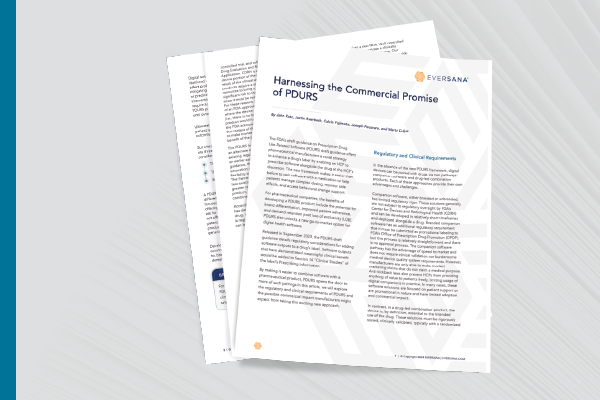
Harnessing the Commercial Promise of Prescription Drug Use-Related Software (PDURS)
The FDA’s draft guidance on Prescription Drug Use-Related Software (PDURS) offers pharmaceutical manufacturers a novel strategy to enhance a drug’s label by enabling an HCP to prescribe software alongside the drug at the HCP’s discretion. The new framework makes it easier than before to pair software with a medication to help patients manage complex dosing, monitor side effects, and access behavioral change support. For pharmaceutical companies, the benefits of developing a PDURS product include the potential for brand differentiation, improved patient adherence, and demand retention post loss of exclusivity (LOE). PDURS also unlocks a new go-to-market option for digital health software. Released in September 2023, the PDURS draft guidance details […]

An Impactful Year for Global Regulation of Digital Health
2023 was a busy year with FDA and EU advancing key initiatives focused on AI/ML, cybersecurity, global harmonization, real-world evidence, and pharma companion apps…and more is coming in 2024. While 2023 brought its share of challenges for the digital health sector, it ultimately served as a pivotal year for shaping the future of how digital medical devices are developed and regulated. Many new regulations and policies were introduced or issued after years in the making, and others were reactions to sweeping technological and methodological industry advancements that required broad changes in the global regulatory environment. First, we’ll zoom in on key global initiatives poised to shake up digital health. Then, […]

A Framework for Branded Pharma Companion Apps Is Coming Soon
The FDA just announced plans to release a draft guidance on prescription drug-use-related software later this year. What should the pharma industry expect? The past three years have seen a significant increase in the acceptance and adoption of digital health tools. Much of the focus over this time has been on virtual care using telemedicine and remote monitoring, but individuals are increasingly managing their own health, with a recent Morning Consult survey reporting that 40% of adults now use mobile health apps and 35% use wearables. A wave of innovation is coming from pharmaceutical companies who plan to take advantage of this momentum by seeking to improve the therapy experience […]

Breaking Down Q1 2023 Digital Health Policy Updates
Insights and Implications on AI/ML Software, Companion Apps for Pharma, Digital Diagnostics, VR Software, Breakthrough Devices, and More There was a barrage of activity by FDA in Digital Health at the end of 2022, including the wind-down of the Digital Health Pre-Certification program, final guidance on Clinical Decision Support Software, Mobile Medical Applications, Medical Device Data Systems, and Computer-Assisted Detection (CAD) Software, draft guidance on Cybersecurity, resource pages on Augmented Reality/Virtual Reality and Artificial Intelligence/Machine Learning (AI/ML). There were also several notable reimbursement decisions and legislative activities at the end of 2022 and into 2023, including new CPT codes and payer decisions on remote monitoring. There has been another barrage […]
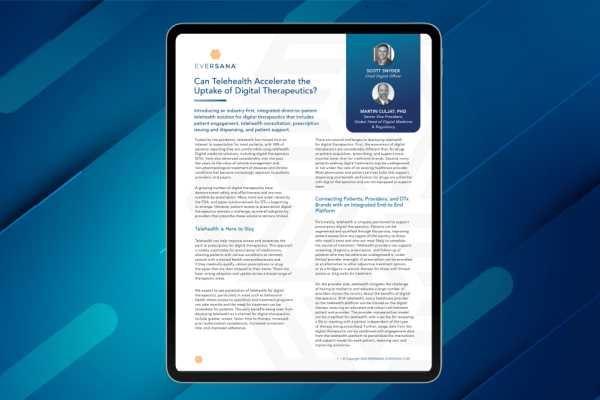
Can Telehealth Accelerate the Uptake of Digital Therapeutics?
Introducing an industry-first, integrated direct-to-patient telehealth solution for digital therapeutics that includes patient engagement, telehealth consultation, prescription issuing and dispensing, and patient support. Fueled by the pandemic, telehealth has moved from an interest to expectation for most patients, with 76% of patients reporting they are comfortable using telehealth. Digital medicine solutions, including digital therapeutics (DTx), have also advanced considerably over the past few years as the value of remote management and non-pharmacological treatment of diseases and chronic conditions has become increasingly apparent to patients, providers, and payers. EVERSANA®, in partnership with UpScript Health, has developed the industry’s first and only patient-led virtual care model leveraging full-scale commercial solutions to accelerate […]

Rounding Up FDA’s Digital Health Actions from 2022 and Looking Forward to 2023
The healthcare sector continued the digitization evolution in 2022. Among the many product launches and technological advances, a recent report from AMA showed that 93% of physicians now see digital health tools as advantageous to patient care and that adoption of telemedicine, remote monitoring, clinical decision support, and patient engagement tools are on the rise. Likewise, pharma companies are increasingly adopting digital companion apps for drugs and pursuing regulated software such as standalone digital therapeutics. And reimbursement for digital health continues to advance in the U.S. and Europe and is beginning to emerge in the Asia Pacific region. As digital health has been maturing, the FDA continues to adapt, helping […]

Seven Important Factors for APAC Companies to Consider while Launching Products in the Digital Health and Digital Therapeutics Space
Digital health and digital therapeutics innovation, commercialization, and adoption is accelerating in the APAC region. Digital medicines as an area, globally, is not new, yet even the largest players in the sector can still be considered start-ups in many respects. This is because the regulatory and reimbursement pathways are still evolving, and this has had an impact on adoption and scale up. This continuing emergence has led to the exploration of alternative commercial models by many players in the space, with varying levels of success including in APAC. As a follow-up to the framework comparing regulatory requirements for DTx in the APAC region, put together by EVERSANA™’s digital medicine team, […]
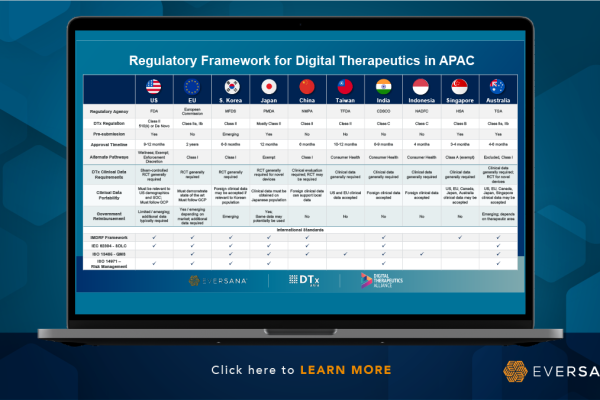
Regulatory Framework for Digital Therapeutics in the APAC Region
Authored by: Martin Culjat, Kory Dillman, Deval Patel Digital health and digital therapeutics innovation, commercialization, and adoption is accelerating in the APAC region, and this has been in full display at the first-ever DTx Asia conference held in Seoul, South Korea on November 8 and 9, 2022. DTx manufacturers are seeking authorization from global regulatory bodies, particularly in markets with emerging reimbursement opportunities. However, the regulatory hurdles across APAC are still unclear to many, as are the advantages and challenges in approaching these markets. Fortunately, the APAC regulatory bodies have made considerable advances in the oversight of digital health and software-as-a-medical device (SaMD). Emerging examples from trailblazing companies such as […]
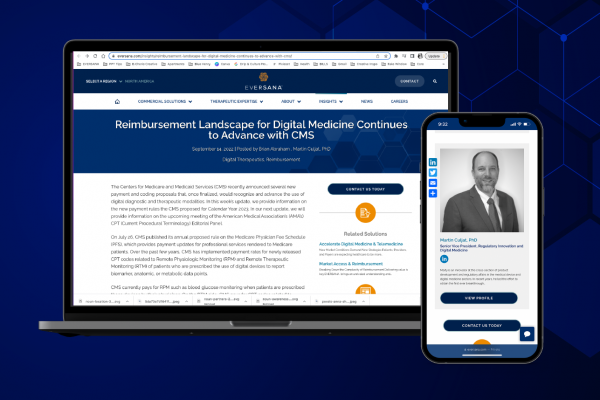
AMA Scheduled to Deliberate Potential Approval of Additional Digital Medicine CPT Codes
As part of its upcoming meeting in mid-September, members of the American Medical Association’s (AMA) CPT Editorial Panel will consider several new Current Procedural Terminology (CPT) codes that identify digital diagnostic and therapeutic procedures. Between this CPT Editorial Panel meeting and the proposed rule from the Centers for Medicare and Medicaid Services (CMS) previously discussed, it is apparent that payers are continuing to recognize the need to evaluate, cover, and reimburse for these innovations. Panelists primarily discuss two major types of codes during this meeting: permanent and temporary codes. Permanent codes, known as Category I codes, receive an indexed value, known as Relative Value Units (RVUs) and can then be […]
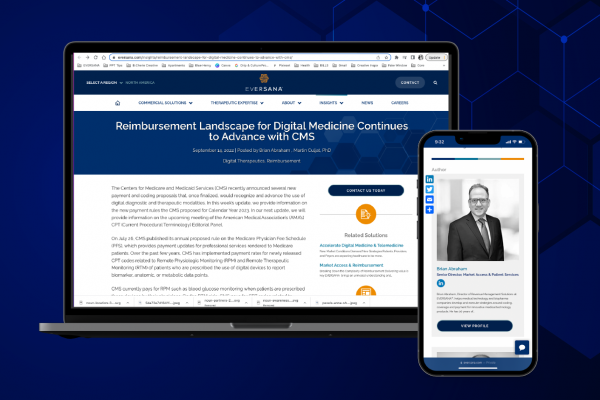
Reimbursement Landscape for Digital Medicine Continues to Advance with CMS
The Centers for Medicare and Medicaid Services (CMS) recently announced several new payment and coding proposals that, once finalized, would recognize and advance the use of digital diagnostic and therapeutic modalities. In this week’s update, we provide information on the new payment rules the CMS proposed for Calendar Year 2023. In our next update, we will provide information on the upcoming meeting of the American Medical Association’s (AMA’s) CPT (Current Procedural Terminology) Editorial Panel. On July 26, CMS published its annual proposed rule on the Medicare Physician Fee Schedule (PFS), which provides payment updates for professional services rendered to Medicare patients. Over the past few years, CMS has implemented payment […]

Exploring a Need for Change of Clinical Trials in Digital Medicine | A DTx Europe Panel Discussion
Martin Culjat, Senior VP, Regulatory Innovation & Digital Medicine, EVERSANA joined a panel of experts at DTx Europe to discuss the need for change of clinical trials in digital medicine. The current framework for clinical trials in digital health falls under an umbrella of one size fits all. There is an unwritten dichotomy between regularly updated software based digital health products and how regulatory frameworks are designed. This panel of experts will dive deep into discussing the need for innovation in policy of clinical trials. What are the key challenges facing the European market in clinical trials today? How can we utilise decentralised clinical trials to bring value to the DTx […]

FDA Moves Cybersecurity Into the Product Life Cycle
Due to rising cyber-attacks and the potential to cause harm to patients, medical facilities and hospitals, the U.S. Food and Drug Administration (FDA) has recently increased scrutiny of cyber controls in FDA premarket submissions of medical devices. Manufacturers must prove that devices, including software-as-a-medical device (SaMD), do not present cybersecurity vulnerabilities that may affect the device’s safety, effectiveness or security. The FDA recently summarized the significance of the situation, stating, “Cybersecurity incidents have rendered medical devices and hospital networks inoperable, disrupting the delivery of patient care across healthcare facilities in the US and globally.” Both Congress and the FDA recently introduced actions addressing the problem. The bipartisan PATCH Act (Protecting […]

New Legislation Supports Payment for Digital Therapeutics
Earlier this month, the Access to Digital Prescription Therapeutics Act of 2022 was introduced by Rep. Mike Thompson (D-CA) to the U.S. House of Representatives as H.R. 7051 and by Sen. Shelley Moore Capito (R-WV) to the U.S. Senate as S. 3791. This precedent-setting legislation demonstrates the bicameral, bipartisan commitment to promoting the use of digital prescription therapeutics and having public insurers cover their use. The identical bills mandate coverage of prescription digital therapeutics (PDTs) by Medicare and Medicaid and set forth the general process for how the Centers for Medicare and Medicaid Services (CMS) will administer the coverage. The legislation defines PDTs as products that are approved or cleared […]

Prescription Digital Therapeutics Coding: A Good First Step by CMS
The Centers for Medicare and Medicaid Services (CMS) recently issued a new code under the Healthcare Common Procedural Coding System (HCPCS) regarding prescription digital therapeutics (PDTs). These types of therapies are generally app- or device-based and can be used in any therapeutic category. This is certainly an exciting development for the PDT sector, as many companies in the space have been targeting claims-based reimbursement for their products, and scalable reimbursement has not yet been widely achieved. During the July 2021 coding application cycle, one developer of cognitive behavioral therapies (CBTs) applied for three different HCPCS codes to identify the use of their apps in CBT to treat substance abuse as […]

Breaking News: Updates on Digital Medicine Coding and Payment
Over the past several months, we have been following the activities of the American Medical Association (AMA) and the Centers for Medicare and Medicaid Services (CMS) regarding coding and payment, respectively, for digital medicine products. Both organizations made significant steps forward in the past few weeks to include some of these innovative products in the medical reimbursement stream. Here is the latest news and our analysis. Cognitive Behavioral Therapy (CBT) Applications Many digital therapeutics are designed to deliver a digitized form of condition-specific cognitive behavioral therapy (CBT) for adjunctive treatment of a variety of conditions. The Digital Therapeutics Alliance (DTA), AdvaMed, and others have made considerable efforts to create payment […]

TOP NEWS: CMS Proposes Repeal on Medicare Coverage of Innovative Technologies Initiative
In a reversal of its upcoming policy to cover breakthrough designated medical devices, the Centers for Medicare and Medicaid Services (CMS) on Monday issued a proposed rule that would completely repeal the Medicare Coverage of Innovative Technologies (MCIT) initiative, and it would not go into effect in December of this year. Their reasoning is as follows: Even though the affected products receive FDA clearance and breakthrough designation, there is no requirement, as there is with other Medicare coverage mechanisms, to show effectiveness in a Medicare population; so the product(s) may end up being detrimental to Medicare beneficiaries without a level of evidence showing effectiveness and no harm to this population. […]

American Medical Association Discusses New CPT Codes to Identify Digital Health Services
In our last update, we discussed the proposed rule that the Centers for Medicare and Medicaid Services (CMS) issued regarding the addition of certain Current Procedural Terminology (CPT®) codes to identify remote therapeutic monitoring (RTM) in parallel to the existing remote physiological monitoring (RPM) codes and their expected payment rates. Now we’re looking at what could happen over the next year or two as the American Medical Association (AMA) releases new codes that identify additional digital health services. Several new codes will be up for discussion during the September 2021 CPT Editorial Panel meeting, in which the panel members deliberate over proposed new and revised codes that healthcare providers will […]

CMS Releases Remote Therapeutic Monitoring Codes for 2022
The Centers for Medicare and Medicaid Services (CMS) released the proposed Medicare physician fee schedule regulation for 2022, which includes an analysis and payment calculations for the new Remote Therapeutic Monitoring (RTM) CPT codes issued by the American Medical Association (AMA) late last year. As announced in earlier this year, these codes may enable indirect reimbursement for digital therapeutics and similar devices by identifying the physician’s (or other qualified professional) services that will be associated with utilizing the device. This may allow digital therapeutic manufacturers to offer their products to healthcare providers as a service and for the provider to get reimbursed for setup, use and management of the product. […]

News Alert: MCIT Program Delayed Until December
The Centers for Medicare and Medicaid Services (CMS) again delayed implementation of the Medicare Coverage of Innovative Technology (MCIT) program, now until December 15, 2021. The program, as described in the current and preceding rules, will provide automatic Medicare coverage for four years to medical devices designated as breakthrough and authorized for marketing by the U.S. Food and Drug Administration (FDA). In the Final Rule to be published this week in the Federal Register, CMS states there are several reasons for this additional delay. The delay does not come as a surprise as there were many unanswered operational and policy questions from the January 2021 Final Rule (86 Fed Reg […]

News Alert: MCIT Implementation Delayed
On Friday, March 12, the Centers for Medicare and Medicaid Services (CMS) issued an Interim Final Rule with Comment (IFC) delaying the effective date of the Medicare Coverage of Innovative Technologies (MCIT) initiative from March 15 to May 15, 2021. In postponing the implementation date, CMS cited the President’s Executive Order of January 20, 2021, that allows for the delay of pending regulations so the new administration can review their impact. The order also allows for the reopening of comments on pending regulations to determine if there are concerns regarding operational, governmental or citizen impact. In the IFC, CMS stated directly that because coding and payment systems would not be […]

Reimbursement May Be on the Way for Remote Therapeutic Monitoring
The American Medical Association (AMA) manages the procedure code set that physicians and other healthcare professionals use to identify the services for which they bill. These codes are commonly known as the CPT® code set, which stands for Current Procedural Terminology, and are the standard billing lexicon for medical services. Currently, four CPT codes identify remote monitoring of physiologic data such as weight, blood pressure, pulse oximetry, etc. A few cardiac monitoring codes also include remote collection and/or monitoring of these data. Until now, the CPT code set has not contained any codes to identify remote monitoring of therapeutic interventions, such as those provided by a handheld or digital therapeutic […]

CMS Adopts Automatic Medicare Coverage of Breakthrough Devices
The Centers for Medicare and Medicaid Services (CMS) on January 12 finalized its proposal of Medicare Coverage of Innovative Technology (MCIT), an additional pathway of coverage for breakthrough-designated medical devices, providing timelines and clarifying definitions of eligible items. CMS initially proposed this rule on August 31, 2020, and EVERSANA’s initial analysis is provided here. The rule will go into effect March 15, 2021, at which time Medicare will cover and reimburse medical devices that are designated as breakthrough by the U.S. Food and Drug Administration (FDA). These devices also must be authorized for marketing to receive Medicare coverage for four years. Clarification of Eligible Medical Devices While the proposed and […]

CMS Announces Medicare Coverage for FDA-Designated Breakthrough Devices. What Does This Mean?
On August 31, 2020, the Centers for Medicare & Medicaid Services (CMS) issued a proposed rule change that would automatically provide national Medicare coverage for FDA-designated Breakthrough Devices for a four-year period immediately upon FDA approval. This is big news for patients, health care providers and medical device manufacturers. When the Breakthrough Devices program was originally envisioned several years ago, the intent was to “help patients have more timely access” to breakthrough technologies by creating an expedited pathway for both FDA approval and Medicare coverage. The 21st Century Cures Act, enacted in December 2016, initiated the FDA’s Breakthrough Devices Program but did not simultaneously implement a Medicare coverage pathway. This […]

5 Trends in Digital Medicine to Watch For
We Are Uniquely Positioned To Deliver EVERSANA is uniquely positioned to follow the trends and introduce new models and strategies to maximize the value of pharmaceutical products through Digital Medicine Solutions and Execution. Digital Solutions can be deployed to impact the entire life cycle of a product in unprecedented ways. Schedule a 30-minute call with our Digital Experts Team to learn more.

What does the new FDA Guidance for DTx Products Treating Psychiatric Disorders actually mean?
On April 14, 2020, FDA posted new guidance that eases regulatory enforcement of Digital Therapeutics to improve patient access to psychiatric care during the COVID-19 public health emergency. FDA should be praised for this decision, as there are countless individuals with a variety of mental health conditions who are stuck at home during the COVID-19 crisis. This change in policy makes it easier for these patients to receive critically needed psychiatric treatments without having to visit the clinic. What does this actually mean for DTx companies? The new FDA Guidance suggests that digital therapeutics that utilize behavioral therapies to treat a variety of DSM-5 psychiatric disorders, including depression, alcohol use […]

What kind of clinical data is required for FDA clearance of a Digital Medicine?
What kind of clinical data is required for FDA clearance of a Digital Medicine? It depends. Digital therapeutics and digital medicines that are subject to FDA regulation are considered medical devices. The amount of clinical data required by FDA generally depends on risk. Many moderate risk (class II) medical devices seeking 510(k) clearance are required to perform confirmatory clinical trials to demonstrate that the device is as safe and effective as another legally marketed predicate device. These trials are often single-arm clinical trials, due mainly to challenges of randomizing and blinding medical devices. However, many 510(k) submissions do not require any clinical data. De Novo (usually class II) and PMA […]

What specifically triggers FDA regulation of a digital medicine?
I often meet with Digital Health or Pharmaceutical clients to discuss their commercialization journey, and they ask me the same question. What specifically triggers FDA regulation of a digital medicine? Some of these products require FDA clearance and some do not. Regulatory oversight of digital medicines depends primarily on intended use, which is generally captured in the marketing claims of a product. Software that is intended for diagnosis, treatment, cure, mitigation, or prevention of a disease or condition is considered to be higher risk and is likely to be regulated. Software that indirectly impacts a patient’s health by aiding in their treatment, diagnosis, or triage also typically requires regulatory oversight. […]

